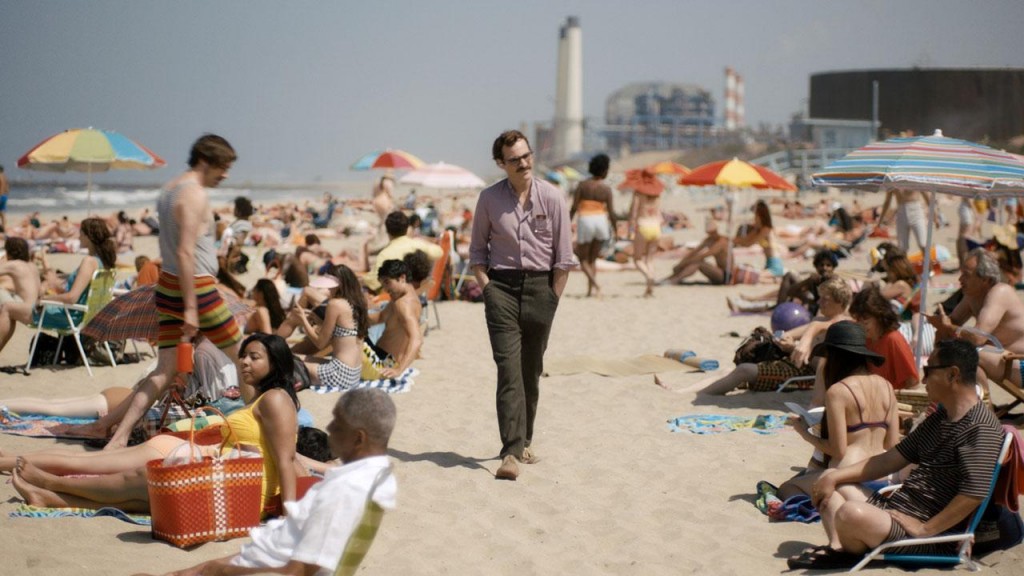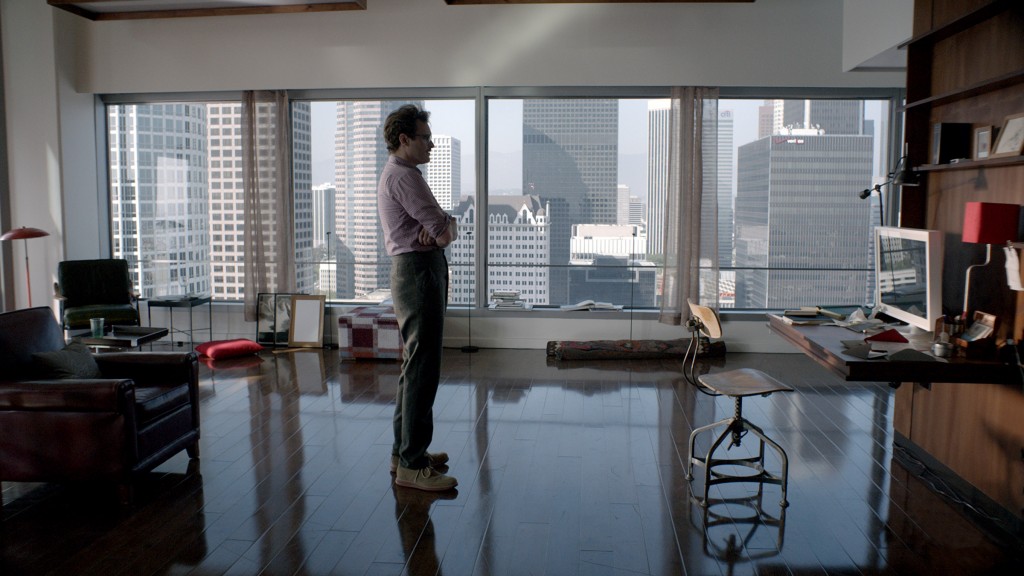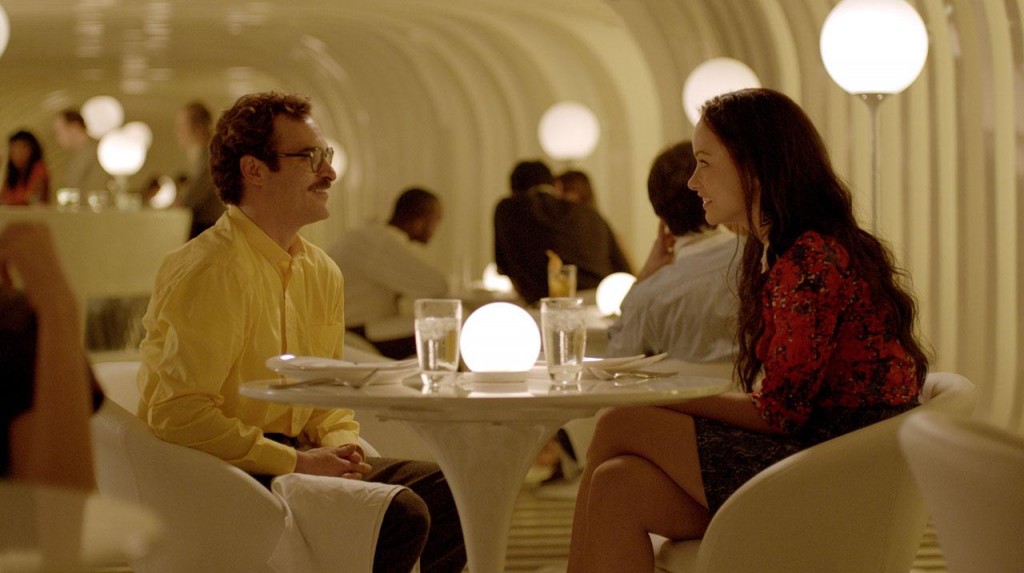This review first appeared in the GC Advocate.

Writer and Director Spike Jonze, the co-creator of the Jackass reality series, has done it again. “her” is about a guy, Theodore Twombly played by Joaquin Phoenix, who goes to the beach in brown suede oxfords, wool pants and long sleeves; in other words, a real jackass. Theodore lives in a huge apartment in the “Beverly Wilshire City Tower” in a futuristic Beverly Hills (filmed in a digitally white-washed Shanghai) with a great view of the city. He’s the type of guy who can go out and by the latest gadget without thinking about his budget. He’s definitely not living off an adjunct’s salary.

Many reviews of the movie I’ve read have focused on the perceived social commentary this film makes—about technology and love, and who we are or could be in this digital age. For some, Theodore can stand in as the “every man” and his story comes off as “our story”. For others, like me, his story is not the generic story of “our” near future. His is a story of misogynistic, white class privilege that speaks only to a white, male fantasy of our near future, where systems like Siri have developed their own unique intuition and personalities, and nearly all the people of color have left LA. The premises of this film are based in a very specific kind of masculine fantasy that is deeply racialized as white, and steeped in a bourgeois mindset. It is not simply accidental that the main character is a straight, white, able-bodied man and his love interest is just a voice. The film, as written and directed, would not have worked any other way because it relies fundamentally on white, male tropes.
To me, the film is so bad that I cannot even discuss what everyone wants the film to be about. People think “her” speaks to our relationship with technology, commodity fetishism, digital dualism, artificial intelligence, all while telling a touching love. I wouldn’t mind seeing a movie about these things, but there is too much crap in the way for this movie to successfully be about them, and it isn’t actually technologically innovative at all—when it comes to the science fiction it is pretty weak and filled with holes. This particular review is about the extent to which the audience must first discount a lot of other aspects of the film to come away with having seen a film about technology and/or love.
The viewer’s first experiences with Theodore are meant to convey what a sweet and sensitive guy he is. He writes love letters for a living and listens to self-described melancholy songs. He is also lonely and lies awake at night missing his almost ex-wife remembering the good times, like when she playfully strangled him while repeating how she was going to kill him. Yes, those fond memories of someone jokingly threatening your life because they “love you so much”. This is the kind of romance Theodore is into—later you see him draft a love letter for a client, describing how his love made him want to punch the world’s face. These are just two of many scenes where sex, love and violence are mixed together. In my experiences talking to people about this film no one saw this as central to the storyline (except for my friend, Monique Whitaker, who was kind enough to see this bad movie with me and help me write this review). But this was not an isolated part of the film; it is central to the way Spike Jonze wrote and directed the characters and the storylines. With an eye for it, you can see this appear over and over again in the film. Jonze is ill-equipped to write a love story, or perhaps any story, that isn’t creepy and rape-y.
When Theodore is lying in bed, soon his restlessness is too much to take and he calls up for some phone sex—remember, the science fiction is weak, so he’s basically using a Bluetooth headset that fits in his ear to make a call. The conversation tries to lead the audience to imagine that Theodore is a sweet, lonely guy, though he is actually really creepy…and rape-y. He tells the woman on the phone that if they were in bed together, “I’d have to wake you up from the inside”. The fantasy of waking a woman up by putting something into her body relies on a desire for male control, a desire for the power to rape. When someone is sleeping they cannot consent to be penetrated. However, this line is meant to be interpreted as a sweet and romantic one, almost as the equivalent as a desire to cuddle. The problem isn’t that Theodore has violent fantasies or that he would want to play them out in a consensual phone sex encounter—the problem is that none of the violence is seen as violent. I am not averse from watching violent and sexist movies, and even from enjoying them, but what concerns me is that the violence and sexism in “her” is so insidious that viewers hardly notice it. Even when it is overt, the reception of violence as violence is detracted by its presentation as comedy. The ‘comic relief’ comes in when this woman he is having phone sex with starts asking him to choke her with a dead cat—the cat and its death are given no thought. He plays along with this, the audience laughs, and the woman climaxes upon her fantasized death by strangulation with a dead cat’s tail. This is just not funny, nor, unfortunately, is it original.
Since the violence operates in the background, likely largely unconscious on the part of the writer/director, actor, and viewer, scenes like this are not seen as central to the film’s stated storyline, but they are central to the character development. More ‘comic relief’ follows when Theodore is playing a video game and encounters a small, cute, white alien child. This character, expected to be sweet because of his appearance, instead turns out to be a jackass—a more overt parallel to Theodore’s own story line. He and Theodore go back and forth telling each other to fuck themselves. The alien, then, sticks around as Theodore looks at pictures of a woman he might go out with, a nameless character played by Olivia Wilde. This little alien says she is fat. Yes, the comedy in this movie is on the level of fat jokes. But we shouldn’t worry, it’s not understood to be offensive because she’s obviously not fat, and this little guy is just a jackass. And we, like Theodore, are supposed to laugh at this, and indeed the audience does, which functions as a double violence to the viewer with a critical mindset. This alien child then says “I hate women; all they do is cry all the time”. Again, this is supposed to be funny, and the audience laughs. Yet, what the audience might not know is that not only does Jonze write these lines, but he is the one who voices the alien child. Jonze’s misogyny could not be contained: he actually yells out in the middle of his own movie, “I hate women”. Hating women is never a punch-line. And maybe Jonze should check himself, because if women are crying around him all the time it might have something to do with his treatment of them.

When Theodore does go out on his date with Olivia Wilde’s character, who still remains tellingly nameless and is credited only as “Blind Date”, he confesses to having looked up information about her. She says, “That’s so sweet,” and then proceeds to call him a “puppy dog”. This so-called puppy dog of a man doesn’t want to be a puppy dog, though. Theodore says, “I want to be a dragon that can rip you apart and destroy you, but I won’t”. Though Theodore won’t do this, he still has the misogynist desire for the power to rip a woman apart and destroy her. Theodore, here, is participating in rape culture—something Jonze seems deeply immersed in. In rape culture, which this near future is still clearly a part of, the nice guy is the one who can rape you at any moment, but won’t. What Theodore said is violent, but my concern is that the audience does not see this as such because it is wrapped up in the general patriarchy of the film that positions Theodore as our only slightly flawed protagonist. After the date, when Olivia asks him if he was just going to fuck her and not call her he can’t help but let his face betray the truth. She responds with, “You’re a really creepy dude”—the only moment of true insight in the film—though within the movie the line comes off as out of place, so that she seems a bit like an overly reactionary woman, and Theodore a bit like a victim.
All this is not even to get into the relationship you were likely expecting me to write about. That relationship between Theodore and Samantha, his intuitive operating system—the “her” with whom he engages in a romantic and sexual relationship. Some readers may be saying that I’ve missed the point; I didn’t even talk about the movie’s real focus, the core relationship of the film. But this movie is not a love story; it’s a white patriarchal fantasy that doesn’t speak to more than what it is—which is just that—with the technology and weak science fiction just a cover for the same old tired misogynistic tropes. What the film can do, however, is to show us just how much we do not see when we are taking in culture, and how much we are made to overlook to participate in dominant culture. This is not a condemnation of the viewer—this movie, and our unconscious reception of its violence, is white supremacy and patriarchy at work.
Comments by chrissy